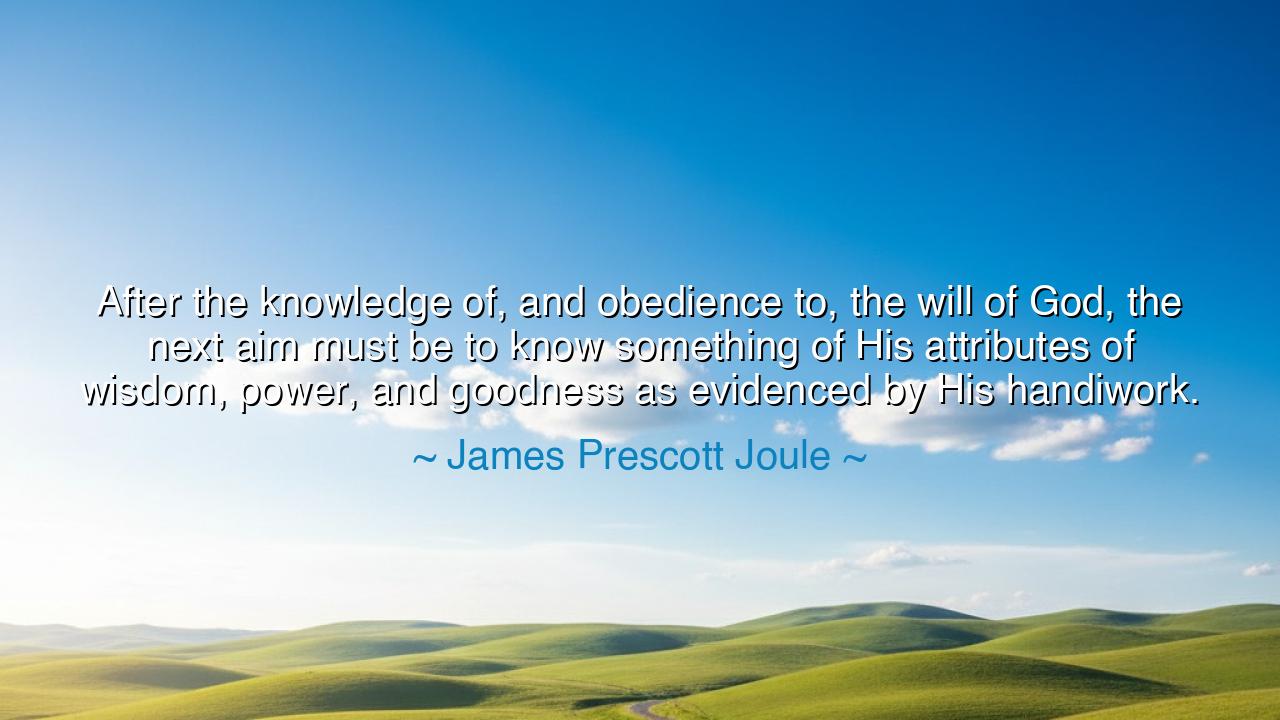
After the knowledge of, and obedience to, the will of God, the
After the knowledge of, and obedience to, the will of God, the next aim must be to know something of His attributes of wisdom, power, and goodness as evidenced by His handiwork.






In the noble words of James Prescott Joule, the great physicist and humble seeker of divine truth, we find a union of science and spirit, a harmony between faith and reason. He declared: “After the knowledge of, and obedience to, the will of God, the next aim must be to know something of His attributes of wisdom, power, and goodness as evidenced by His handiwork.” These words shine like a beacon from an age when men still saw the heavens not as cold mechanisms, but as the living thoughts of a Creator. Joule, who uncovered the law of conservation of energy, saw in every vibration, every motion, the whisper of divine order. His words are both a reverence and a revelation — that to study creation is, in truth, to study the Creator Himself.
In this saying, Joule speaks first of obedience to the will of God, for knowledge without humility is hollow. The ancients taught that before one may look upon truth, one must kneel before it. The will of God is not merely command; it is alignment — the soul’s harmony with the great purpose that moves all things. Only when a person walks in obedience, with heart open and will surrendered, may they begin to perceive the deeper mysteries of existence. For to see the hand of God, one must first learn to trust His heart.
Then comes the second call — to know the attributes of God: His wisdom, His power, and His goodness, which are made manifest in His handiwork. Joule, like the prophets and philosophers of old, saw that nature is not a veil hiding God, but a window revealing Him. The precision of the stars, the balance of the oceans, the rhythm of energy flowing from flame to motion — all declare a law not born of chance, but of mind. Thus, in every experiment, he sought not merely numbers and measurements, but glimpses of divine order.
Consider the life of Isaac Newton, who, centuries before Joule, gazed into the fabric of creation and declared, “Gravity explains the motions of the planets, but it cannot explain who sets the planets in motion.” Both Newton and Joule saw that the laws of nature are not rivals to God’s will but its expression. To them, studying the world was an act of worship — the temple not built by hands but by stars, rivers, and atoms. Each discovery was a psalm, each equation a form of prayer. They understood that wisdom, power, and goodness were not abstract virtues but the fingerprints of the Eternal upon the tapestry of creation.
And yet, there is a sadness in our age, when many look upon the works of God and see only randomness — when the beauty of order is mistaken for accident, and the voice of harmony is dismissed as noise. Joule’s words are a remedy for this blindness. He teaches that the scientist and the saint, though they walk different paths, ascend the same mountain. One climbs by experiment, the other by meditation, yet both seek the summit where truth and divinity meet.
Let his message be a call to all who search for understanding: seek first the will of God, that your knowledge may be guided by purpose, and your discovery grounded in humility. Do not fear to look deeply into the world — into the laws that bind light and motion, into the pulse of the living cell, into the measure of the stars — for in all these, the attributes of God await your recognition. Let your curiosity be sacred, your intellect a flame of devotion.
The lesson is this: every act of study, if done in reverence, becomes an act of worship. Every truth uncovered in nature is a reflection of divine wisdom, every force discovered a manifestation of divine power, and every harmony observed a testament to divine goodness. To live as Joule lived is to walk with wonder — to see in each sunrise not only beauty but design, and in each discovery, not pride but praise.
Therefore, children of light and seekers of truth, let your minds be sharp, but your hearts be humble. Obey first the will of God, then study His handiwork with awe. For when science bows to reverence and knowledge serves the spirit, the world becomes not a machine, but a miracle — and every breath, a quiet hymn to the eternal wisdom, power, and goodness of the One who made it.






AAdministratorAdministrator
Welcome, honored guests. Please leave a comment, we will respond soon